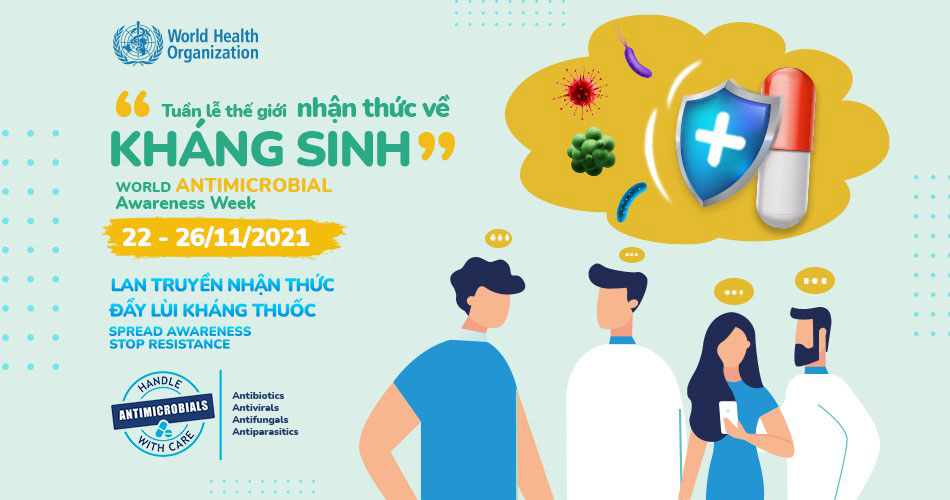World Antimicrobial Awareness Week (WAAW) takes place annually from 18-24 November to remind and increase global awareness of antibiotic resistance. FV Hospital continues to adopt this occasion to communicate about the importance of correct antibiotics use in the community in general and the health sector in particular. This action also encourages the collective activities to prevent the future emergence of dangerous resistant bacterial strains.

Harmful effects of antimicrobial resistance
Antimicrobial resistance is the ability of microorganisms such as bacteria, viruses, fungi, or parasites to grow despite the presence of a medicine that would usually kill or limit their growth in a body. As a consequence, conventional treatments are no longer effective. Infections become harder to treat, leading to more severe illness, increased treatment costs and a higher risk of death. Due to antimicrobial resistance, infections like pneumonia, urinary tract infections, and tuberculosis are becoming more and more difficult to treat and sometimes impossible to treat.
In May 2015, World Health Assembly adopted a global action plan for antimicrobial resistance with strong support from the Food and Agriculture Organisation – United Nations (FAO). World Organisation for Animal Health (OIE) and especially the World Health Organisation (WHO).
Many people may be surprised to know that this global event is actively supported by FAO and OIE. The inappropriate use of antibiotics in the treatment of human diseases is only part of the cause; another reason for antimicrobial resistance is from food sources, especially from livestock, poultry and seafood. Antimicrobial are introduced into the cultivation and processing of animal food, and are widely used in aquaculture. Therefore, the antimicrobial resistance can grow in these organisms before being introduced to humans through ingestion.
Besides the reasons mentioned above, patient may not use the correct dose, or receive the correct duration for antimicrobial agents; The problem of infection control in hospitals and clinics may be adequate; such as poor hygiene in hospitals etc. can also be a cause of antimicrobial resistance. These resistant bacteria grow on the intestinal wall of people inappropriately using antibiotics. Under the poor infection control, these kinds of bacteria could have the condition to spread to the community. The WHO said that during the COVID-19 outbreak, the issue of antimicrobial resistance is even more serious. WHO predicts that by 2050, antimicrobial resistance will be considered a pandemic, and the world could have about 10 million people dying from this factor.
“Spread awareness, Stop resistance”
The government has put much effort to limit the problem of antimicrobial resistance, from good practice in the health care system and communication about antibiotic use in animal husbandry. However, in recent years, Vietnam is still in the alarm group in the Asia-Pacific region regarding this issue. WHO has confirmed major difficulties that Vietnam faces; such as, the widespread sale and use of antibiotics without prescription, inappropriate antibiotic prescription and patients’ overuse of antibiotics. Not to mention the practice of other industries related to antimicrobial resistance such as environmental management, animal husbandry, agriculture and food processing,.. which are facing many obstacles.
In 2021, with the slogan “Spread awareness, Stop resistance”, World Antimicrobial Awareness Week continues to help many people in different sectors strives to increase awareness about the danger of antimicrobial resistance, and the difficult long-term battle to address the issues. Antimicrobial resistance is a global problem so everyone should take responsible for it. In Vietnam, the government is expanding cooperation with many countries and global health organisations to develop plans to communicate effectively and help limit the development of antimicrobial resistance in Vietnam.
Since the early days of operation, FV Hospital has paid special attention to the situation of antimicrobial resistance. With the JCI certification in 2016, FV has built more programmes to strictly control antimicrobial resistance. Mr Mohd Fazli Shuib (Head of Pharmacy Department – FV Hospital) said: “FV established an Antibiotics Stewardship Program with the participation of many departments, applying tested and standardised treatments that can be measured to limit the overuse of antimicrobials”. This program is built on the regulations issued by the Ministry of Health, quality standards from the JCI and the US-CDC for antibiotics management in hospitals.
In addition, from 2016 to now, FV has organised the World Antimicrobial Awareness Week annually with many activities to raise awareness for community both inside and outside the hospital, about the alarming state of this issue. To combat antimicrobial resistance, we cannot depend on the health industry alone. Therefore, with our effort, FV hopes to reach many more people about the situation in Vietnam and around the world.



